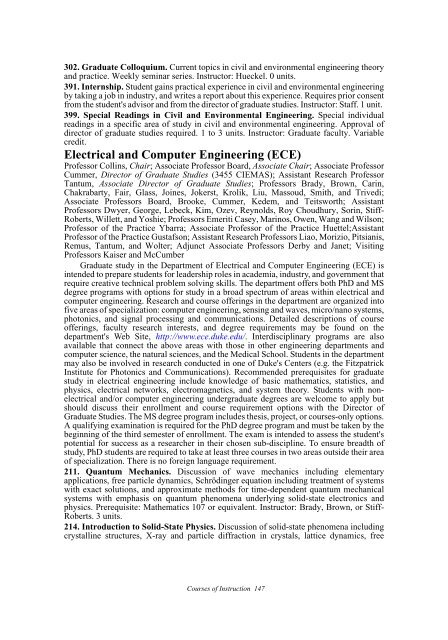Duke University 2008-2009 - Office of the Registrar - Duke University
Duke University 2008-2009 - Office of the Registrar - Duke University
Duke University 2008-2009 - Office of the Registrar - Duke University
Create successful ePaper yourself
Turn your PDF publications into a flip-book with our unique Google optimized e-Paper software.
302. Graduate Colloquium. Current topics in civil and environmental engineering <strong>the</strong>ory<br />
and practice. Weekly seminar series. Instructor: Hueckel. 0 units.<br />
391. Internship. Student gains practical experience in civil and environmental engineering<br />
by taking a job in industry, and writes a report about this experience. Requires prior consent<br />
from <strong>the</strong> student's advisor and from <strong>the</strong> director <strong>of</strong> graduate studies. Instructor: Staff. 1 unit.<br />
399. Special Readings in Civil and Environmental Engineering. Special individual<br />
readings in a specific area <strong>of</strong> study in civil and environmental engineering. Approval <strong>of</strong><br />
director <strong>of</strong> graduate studies required. 1 to 3 units. Instructor: Graduate faculty. Variable<br />
credit.<br />
Electrical and Computer Engineering (ECE)<br />
Pr<strong>of</strong>essor Collins, Chair; Associate Pr<strong>of</strong>essor Board, Associate Chair; Associate Pr<strong>of</strong>essor<br />
Cummer, Director <strong>of</strong> Graduate Studies (3455 CIEMAS); Assistant Research Pr<strong>of</strong>essor<br />
Tantum, Associate Director <strong>of</strong> Graduate Studies; Pr<strong>of</strong>essors Brady, Brown, Carin,<br />
Chakrabarty, Fair, Glass, Joines, Jokerst, Krolik, Liu, Massoud, Smith, and Trivedi;<br />
Associate Pr<strong>of</strong>essors Board, Brooke, Cummer, Kedem, and Teitsworth; Assistant<br />
Pr<strong>of</strong>essors Dwyer, George, Lebeck, Kim, Ozev, Reynolds, Roy Choudhury, Sorin, Stiff-<br />
Roberts, Willett, and Yoshie; Pr<strong>of</strong>essors Emeriti Casey, Marinos, Owen, Wang and Wilson;<br />
Pr<strong>of</strong>essor <strong>of</strong> <strong>the</strong> Practice Ybarra; Associate Pr<strong>of</strong>essor <strong>of</strong> <strong>the</strong> Practice Huettel;Assistant<br />
Pr<strong>of</strong>essor <strong>of</strong> <strong>the</strong> Practice Gustafson; Assistant Research Pr<strong>of</strong>essors Liao, Morizio, Pitsianis,<br />
Remus, Tantum, and Wolter; Adjunct Associate Pr<strong>of</strong>essors Derby and Janet; Visiting<br />
Pr<strong>of</strong>essors Kaiser and McCumber<br />
Graduate study in <strong>the</strong> Department <strong>of</strong> Electrical and Computer Engineering (ECE) is<br />
intended to prepare students for leadership roles in academia, industry, and government that<br />
require creative technical problem solving skills. The department <strong>of</strong>fers both PhD and MS<br />
degree programs with options for study in a broad spectrum <strong>of</strong> areas within electrical and<br />
computer engineering. Research and course <strong>of</strong>ferings in <strong>the</strong> department are organized into<br />
five areas <strong>of</strong> specialization: computer engineering, sensing and waves, micro/nano systems,<br />
photonics, and signal processing and communications. Detailed descriptions <strong>of</strong> course<br />
<strong>of</strong>ferings, faculty research interests, and degree requirements may be found on <strong>the</strong><br />
department's Web Site, http://www.ece.duke.edu/. Interdisciplinary programs are also<br />
available that connect <strong>the</strong> above areas with those in o<strong>the</strong>r engineering departments and<br />
computer science, <strong>the</strong> natural sciences, and <strong>the</strong> Medical School. Students in <strong>the</strong> department<br />
may also be involved in research conducted in one <strong>of</strong> <strong>Duke</strong>'s Centers (e.g. <strong>the</strong> Fitzpatrick<br />
Institute for Photonics and Communications). Recommended prerequisites for graduate<br />
study in electrical engineering include knowledge <strong>of</strong> basic ma<strong>the</strong>matics, statistics, and<br />
physics, electrical networks, electromagnetics, and system <strong>the</strong>ory. Students with nonelectrical<br />
and/or computer engineering undergraduate degrees are welcome to apply but<br />
should discuss <strong>the</strong>ir enrollment and course requirement options with <strong>the</strong> Director <strong>of</strong><br />
Graduate Studies. The MS degree program includes <strong>the</strong>sis, project, or courses-only options.<br />
A qualifying examination is required for <strong>the</strong> PhD degree program and must be taken by <strong>the</strong><br />
beginning <strong>of</strong> <strong>the</strong> third semester <strong>of</strong> enrollment. The exam is intended to assess <strong>the</strong> student's<br />
potential for success as a researcher in <strong>the</strong>ir chosen sub-discipline. To ensure breadth <strong>of</strong><br />
study, PhD students are required to take at least three courses in two areas outside <strong>the</strong>ir area<br />
<strong>of</strong> specialization. There is no foreign language requirement.<br />
211. Quantum Mechanics. Discussion <strong>of</strong> wave mechanics including elementary<br />
applications, free particle dynamics, Schrödinger equation including treatment <strong>of</strong> systems<br />
with exact solutions, and approximate methods for time-dependent quantum mechanical<br />
systems with emphasis on quantum phenomena underlying solid-state electronics and<br />
physics. Prerequisite: Ma<strong>the</strong>matics 107 or equivalent. Instructor: Brady, Brown, or Stiff-<br />
Roberts. 3 units.<br />
214. Introduction to Solid-State Physics. Discussion <strong>of</strong> solid-state phenomena including<br />
crystalline structures, X-ray and particle diffraction in crystals, lattice dynamics, free<br />
Courses <strong>of</strong> Instruction 147









